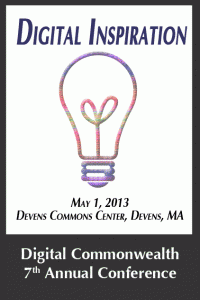Congratulations to the Digital Commonwealth Movers & Shakers of 2014 just announced by Library Journal (http://lj.libraryjournal.com/2014/03/people/movers-shakers-2014/movers-shakers-2014). Featured in the new selection of stellar talent are two local librarians who have had a long and significant involvement with Digital Commonwealth: current board member Tom Blake as well as retired board member and past president Kristi Chadwick.
 Tom is recognized for his leadership in pursuing a partnership between the BPL and Digital Commonwealth that was part of an organizing effort to attain a LSTA digitization grant in 2011. The successful grant was funded for $200,000 for a two-year project to digitize historical materials for members of the Digital Commonwealth. As the entry about Tom explains, “So far, Blake and his team have digitized more than 75,000 objects from 100 institutions, and the DC has grown to 200 members, from large academic libraries to small independent museums. The collections, now in beta, will soon be available via the DC portal and repository system.”
Tom is recognized for his leadership in pursuing a partnership between the BPL and Digital Commonwealth that was part of an organizing effort to attain a LSTA digitization grant in 2011. The successful grant was funded for $200,000 for a two-year project to digitize historical materials for members of the Digital Commonwealth. As the entry about Tom explains, “So far, Blake and his team have digitized more than 75,000 objects from 100 institutions, and the DC has grown to 200 members, from large academic libraries to small independent museums. The collections, now in beta, will soon be available via the DC portal and repository system.”
Tom is also credited for helping establish the strong relationship that has transpired between the BPL, the Digital Commonwealth, and the Digital Public Library of America who chose Digital Commonwealth as one of its initial service hubs. For more about that experience, check out Tom’s recent blog post: Life as a Service Hub for the Digital Public Library of America.
 And if that were not honor enough, Kristi Chadwick is also included in this year’s selection. Kristi is awarded for her work as the Director of the Emily Williston Memorial Library & Museum in Easthampton where she achieved tremendous strides in increased staff appreciation and public support for the library in the short amount of time she has worked there.
And if that were not honor enough, Kristi Chadwick is also included in this year’s selection. Kristi is awarded for her work as the Director of the Emily Williston Memorial Library & Museum in Easthampton where she achieved tremendous strides in increased staff appreciation and public support for the library in the short amount of time she has worked there.
Certainly many remember Kristi for her long association with Digital Commonwealth that included several years serving on the board of directors and a year as president in 2011 and 2012.
Our appreciation goes out to these two for all they have done for librarianship in Massachusetts and particularly for the efforts they have committed to the success of Digital Commonwealth. A well-deserved thank you and congratulations!
